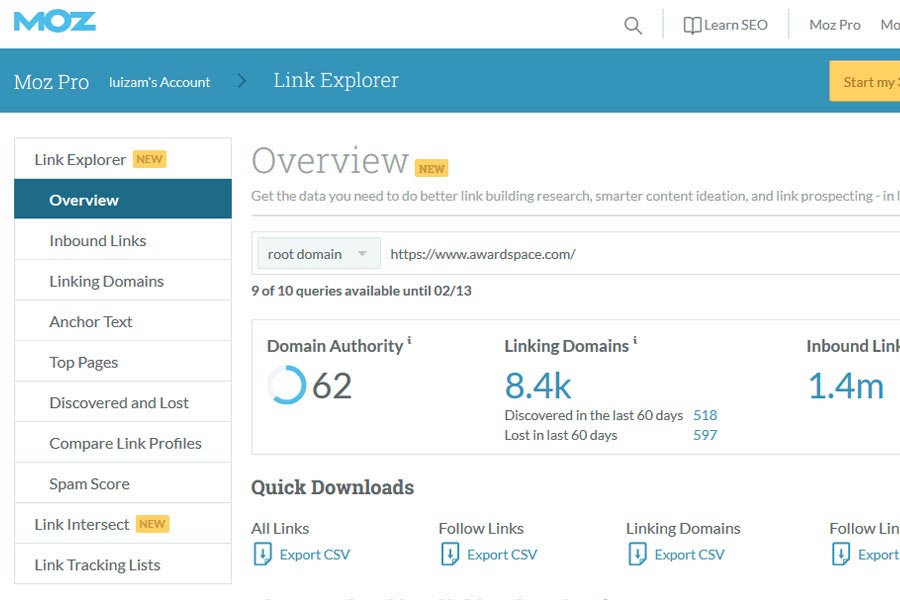The main objective of each and every SEO strategy is typically going higher on the search engine results page or ideally even becoming number one.
While as clear as it may seem, this objective requires a wide variety of practices and factors to take into consideration. In other words, the dimensions of SEO far exceed the most obvious on-page SEO techniques and often involve a thorough analysis of a website’s domain authority.
Domain authority is a search engine ranking score developed by Moz which predicts how well a page will rank on the SERP.
This score ranges from one to 100 and indicates your chances of ranking high. A low score could potentially mean that you are missing out on some ranking and traffic opportunities and it’s time for a change in order to increase domain authority.
It is, however, important to note here that a score between 40 and 50 is considered average and you should not really worry if your domain authority is ranging in those digits.

To check your own domain authority, you can use the Link Explorer tool developed by MOZ, previously known as the Open Site Explorer.
So, how does one increase domain authority? We are looking at the 5 essential component parts of any domain’s value:
Link Diversity and Quality
Link diversity is an SEO term that refers to the range of diverse links that point to your website. While at first, this might not seem like a particularly priority-worth endeavor, getting backlinks from a wide range of different sources has the capacity to boost your SEO and domain authority alike.
The main reason for this is the following. When receiving a number of backlinks from the same website again and again, Google starts giving less value to that URL with time. Google also seems to not give much importance to the endless links from comments and this technique has proven to fail in the long run.
Diversifying SEO backlinks, however, allows search engines to perceive them as valuable and unique entities that are calculated as different links to a target page.
Number of Links
It is not just the diversity and quality of links that matters for good domain authority. The number of links a website has can also enhance your DA with the most important requirement here being the building of a website’s links into each other.
In other words, to boost domain authority, you’ll need to interlink between internal pages as much as possible. Furthermore, linking from external pages such as Home and About us to internal ones allows the creation of a strong link body.
Adding more pages to a website by creating quality content facilitates the process of increasing the number of links within the site. When it comes to blogs, for instance, you can never have too many articles and as long as you add informative content which people will love to read, your linking enterprise should be successful.

Another very clear factor to help increase domain authority is the social media mentions you get. Google’s updated algorithms aim to rank websites by taking into account their social media authority. Being highly popular on social media channels such as Facebook, Twitter, and Pinterest gradually results in going up on the SERP.
All of this, on the other hand, affects your domain authority score.
To have as many social media mentions as possible through sharing it is important to keep producing fresh and up-to-date pages as often as possible. These would ideally include tutorials, articles, and news with high social importance or at least with engaging writing.
Domain Age
While not something you can affect immediately, the domain age slowly but surely results in a high domain authority score. This is mainly due to the assumption that a website that managed to remain relevant and active over time is worth the attention of users and search engines alike.
Just like the good wine, letting age your website might make you impatient but the final taste will make the whole wait worth it.
Remaining persistent through time by publishing new content, having your information updated, and simply registering a regular activity no matter of any circumstances is what makes a domain actually valuable.
In other words, the older the domain, the higher authority it has.
Brand Search Volume
We could keep talking about all of this for ages and your customers and visitors might be choosing your website for whichever reasons they have but the paramount indicator of any brand’s success is the direct mention of its name.
This is how the brand names of Pampers and Kleenex became denominative for the products they sell across the globe. And this is what is the clearest signal search engines can get for your website’s marketing position.
Having people search directly for your brand name (which is presumably also your domain name) affects your search engine performance directly. Having brand awareness is one of the largely underestimated marketing goals as it can rarely be measured in graphs and charts. Nevertheless, Google does take into account your audience’s needs and makes sure to serve your website as a relevant result for their searches.
This, just like the rest of the components we discussed here, is something to work on in order to increase domain authority. The grand advantage in this case, however, is that increasing brand searches affects your overall presence on the market and acts as a neon sign for your high performance.
Investing time and efforts in working on your domain authority is a necessary aspect of your website management as it directly affects your search engine optimization as well. As a process that requires commitment and persistence, however, make sure you remain consistent in your efforts as the fruits of your own hard work are the sweetest.
